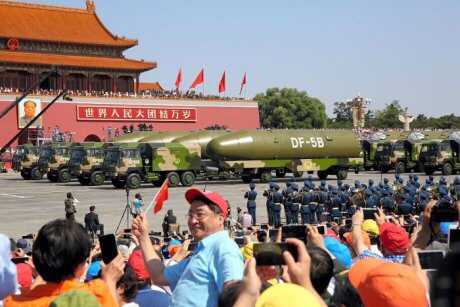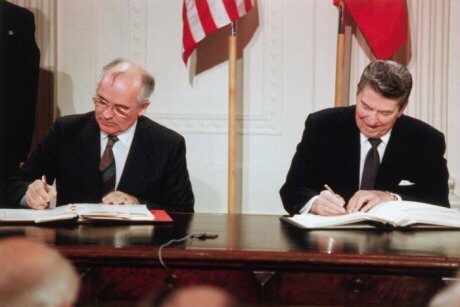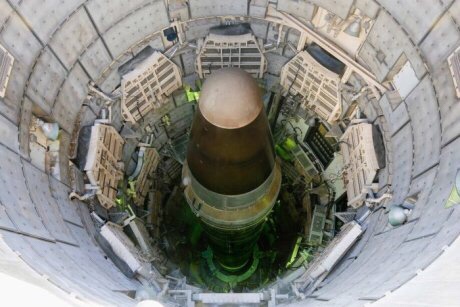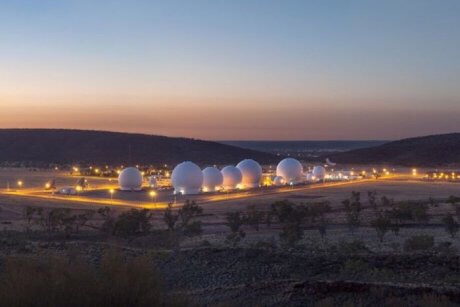
Australia is within range of China's nuclear-capable Dongfeng missiles. Getty: The Asahi Shimbun
Does Australia need a nuclear arsenal? And what would be the cost?
Updated yesterday at 6:19pm
RN By Joey Watson for Late Night Live
Nestled in the native bushland of Jervis Bay on the New South Wales south coast are the concrete footings of a nuclear power station that was never built.
The construction, which began during John Gorton's brief prime ministership in the late 1960s, was to be Australia's first foray into nuclear energy generation.
The reactor would have been able to generate plutonium which, under the auspices of the Australian Atomic Energy Commission, could be used to manufacture nuclear weapons.
But the project did not survive an abrupt change of leadership and Australia ended up riding out the remainder of the Cold War as a non-nuclear player.
Should Australia go nuclear?
Five decades later the nuclear anxieties which coloured Mr Gorton's foreign policy outlook are creeping their way back into international relations.
US President Donald Trump has announced that he will pull the US from the Nuclear Forces Treaty with Russia, as both countries expand their nuclear arsenals.

Getty: Corbis
India is locked in a nuclear tit-for-tat with neighbouring Pakistan, while China has developed nuclear weapons capable of reaching anywhere in the US.
Historically Australia has sought shelter under the US 'nuclear umbrella', but is it time for that to change?
In a recent essay, Dr Stephan Fruhling, the Associate Dean of the College of Asia and the Pacific at the ANU, contemplated the "unthinkable option", and suggested that a nuclear-armed Australia is more likely than ever before.
Fortress Australia
According to Dr Fruhling, Australia's continuous coastline makes it uniquely positioned to 'spike the moat' with tactical, short-range nuclear weapons that could be used against air and maritime forces.
"In air and naval battle on the high seas, nukes can now be employed without significant risk of collateral damage, much like conventional war heads," he told Late Night Live.
"Australia could establish a maritime exclusion zone in wartime, to increase the military risk for any country planning a major attack against the continent."

Getty
But what would be the cost?
The strategic benefits of any nuclear capability would have to be balanced against the possible implications of breaking out of the US nuclear umbrella.
Australia's access to US intelligence, technology, and weapons systems may be compromised if it chose to take on a defence strategy that was less reliant on the US.
"Before investing in a nuclear program I think we would have to make a genuine attempt at trying to draw closer to the United States and its nuclear arsenal," Dr Fruhling said.

If Australia chooses to remain under the US nuclear umbrella, Indonesia presents a unique case in which American and Australian interests may not intersect.
Indonesia is also a US ally, and if it decided to begin its own nuclear program, the implications for the US security guarantee for Australia are not clear.
"Should Indonesia acquire nuclear weapons, relying on US deterrence against a nuclear attack would require a leap of faith about the alignment of Australian and US interests," Dr Fruhling said..
An Australian nuclear program could lead to Indonesia following suit.
"Indonesia has regional leadership ambitions, and a strong sense of independence and will, in coming years, tower over Australia economically as well as in population terms," Dr Fruhling said.
"Australian acquisition of nuclear weapons would strengthen Indonesia's reasons to reciprocate, for status as well as security."
In the meantime, however, Australia's non-nuclear status is important in discouraging Indonesia and other regional players from going down the nuclear path.
To proliferate, or not to proliferate?
During the Cold War America and Britain built their defence plans around nuclear weapons.
Australia, stricken with paranoia, was prepared to play its role in the event of a nuclear war. Warplanes were built that could deliver nuclear warheads to defend South-East Asia.
Australia also backed Britain's nuclear-weapons program with uranium and test facilities at Maralinga, with devastating consequences for local Indigenous communities.
"Australia saw itself as reinforcing the status and significance of its great nuclear-armed friends on which it depended on for its security," Dr Fruhling said.
After the Vietnam War, however, Australia dropped its nuclear ambitions as the great existential threat moved from an Asian communist invasion to a US–Soviet nuclear conflict.
In the early 1970s Australia ratified the Nuclear Non-Proliferation Treaty, after refusing to become a signatory when it was first presented to the UN in 1968.
In the latter decades of the 20th century Australia cemented its place under the US nuclear umbrella and centred its own defence strategy on a superior conventional capability at home.

Photo Britain's first atomic weapon was detonated on the Monte Bello Islands, off the coast of Western Australia in 1952
Wikipedia Commons
Australia's nuclear strategy has remained relatively static over the past half century, advocating for disarmament while remaining close to the US and its nuclear arsenal.
The Federal Government's 2016 Defence White paper reiterated a familiar position.
"Only the nuclear and conventional military capabilities of the United States can offer effective deterrence against the possibility of nuclear threats against Australia," it read.
Last year more than 120 nations held talks to negotiate a treaty that would forbid states from developing or manufacturing nuclear weapons.
The Australian Government refused to take part in the treaty negotiations, claiming they didn't consider the geopolitical realities the world was facing.
For anti-nuclear organisations like the International Campaign to Abolish Nuclear Weapons, a Nobel prize-winning coalition founded in Melbourne, Australia has disregarded its humanitarian duties.
"So long as the Australian Government stubbornly refuses to renounce nuclear weapons for our own security, it will have little luck convincing others to do so," said Tim Wright, the organisation's Asia-Pacific director.
Nukes on the horizon?
When the Gorton Government set out to build nuclear facilities at Jervis Bay in 1968, Cold War tensions were high, Britain was withdrawing from Asia, and Japan was beginning to take its place as a new economic power.
A rapidly changing strategic environment has placed Australia at a similar foreign policy cross-road as China rises, the US retreats, and a series of flashpoints keep the world on edge.
Ultimately, Dr Fruhling believes Australia should only consider nuclear weapons if there is a direct, existential threat to the country.
"I think we would have to genuinely feel under existential threat by a great power from Asia," he said.
"A serious study would be the key to assessing whether nuclear weapons could really be a solution to our prospective security problems, rather than a distraction from them."
No comments:
Post a Comment